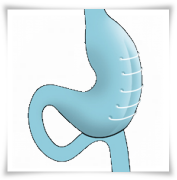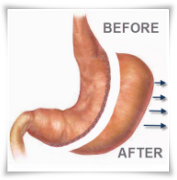Weight Loss Surgery Options
Many people have become much more health conscious these days as the facts and dangers of obesity and illnesses related to excess weight have become more known, hence, there are many weight loss surgery options. These choices range from dieting to exercise to elective weight loss procedures.
Click here to read more about the Gastric Sleeve.
More frequently, the issue of excess weight or obesity is not just related to an attractive appearance, but also the health risks associated with obesity.
Numerous studies have connected obesity to health problems like hypertension, gall bladder disease, heart disease, diabetes, and elevated cholesterol. Weight loss surgery options can help you eliminate the excess fat, and some techniques can even help limit your food intake to prevent that excess weight from coming back. This will lead to a longer, healthier, more active life.
Weight Loss Surgery Options Can Help!
If you are obese or overweight, there are weight loss surgery options that can help you:
- Lose excess weight faster than dieting and exercise
- Improve your health
- Increase your life expectancy
- Feel psychologically better about yourself
- Lower the long-term economic cost
- Reduce the risk of developing weight-related health problems
Stomach Stapling, Gastric Bypass & Gastric Sleeve
This is probably the most common of the restrictive type of weight loss surgery options available, and has been around since the 1950s. This procedure can involve things from gastrointestinal surgery to the stapling of the stomach (gastroplasty) to gastric bypass.
This procedure works by creating a smaller sized stomach. Once complete, an individual can lose the excess weight because they will tend to feel fuller early eating less food than they used to. With the small sized pouch, the patient will not overeat because when too much food is ingested, they most likely they feel ill.
Gastric Banding
One of the most recently developed weight loss surgery options is gastric banding. The whole procedure involves the insertion of the band around the stomach, which is done surgically. This band is designed to minimize the intake of food thereby giving the person a feeling of fullness. It works similar to the gastric sleeve, or stomach stapling where the stomach size is reduced, but in the case of the gastric band, the stomach tissue is not removed. A band is placed around the stomach, and then tightened to create a smaller stomach.
The silicone band is inserted laproscopically, and is adjusted to the patient. Saline is then injected inside the band to expand it, which tightens the band around the stomach. The more saline injected, the bigger the band gets, and the smaller the stomach gets. The band is adaptable, it can be loosened or tightened according to the nutritional needs of the patient. Gastric banding has a good success rate, and it is less invasive than the other weight loss surgery options today.
Based on a 3 year study on the gastric band, it was shown that after undergoing this procedure, 66% of the patients had lost at least 1/4 of their excess weight. Still, there are also some patients who had experienced at least one but not all of the following side effects of the procedure: heartburn, vomiting, band slippage, and some abdominal pain.
The Debate About Weight Loss Surgery Options
 The issue of weight loss surgery can be a sensitive one. Obesity is quickly becoming an epidemic in the United States, and many see these weight loss surgery options as a quick fix. Natural health gurus frown upon surgery as a solution for everyone, but then again, surgery is NOT an option for everyone. Being overweight or obese does not only pose health issues but also social issues, both of which are being faced by a lot of developing countries. An obese person will typically suffer from health problems like diabetes, high cholesterol, high blood pressure, heart problems and sleep apnea, all of which can be remedied if not eliminated by any of the weight loss surgery options mentioned.
The issue of weight loss surgery can be a sensitive one. Obesity is quickly becoming an epidemic in the United States, and many see these weight loss surgery options as a quick fix. Natural health gurus frown upon surgery as a solution for everyone, but then again, surgery is NOT an option for everyone. Being overweight or obese does not only pose health issues but also social issues, both of which are being faced by a lot of developing countries. An obese person will typically suffer from health problems like diabetes, high cholesterol, high blood pressure, heart problems and sleep apnea, all of which can be remedied if not eliminated by any of the weight loss surgery options mentioned.
Supporters of the weight loss surgery options agree that the procedures do help in the management of the problem. On the other side, detractors attest that there is no current proof to suggest that undergoing any weight loss surgery options actually increases life expectancy or helps to improve the status of one’s health. In addition, they propose that all weight loss surgery options regularly engage a secondary or even a third operation to be able to fix the problem. They further attest that these procedures are dangerous and complicated.
However, many studies are being conducted on the effects and results of weight loss surgery options. Some techniques are quite new, so long-term study is still underway, but the initial results on these newer weight loss surgery options have been promising thus far. If you are obese or overweight and are looking at bariatric surgery as a solution, the best advice would be to consult your doctor and get all the facts about the various weight loss surgery options.

